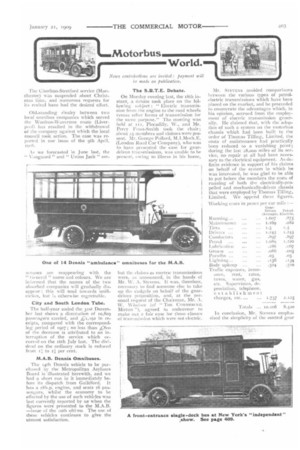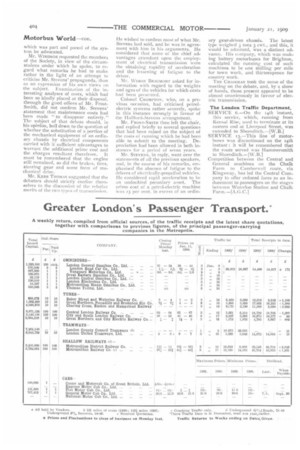Motorbus World.
Page 5

Page 6

If you've noticed an error in this article please click here to report it so we can fix it.
News contributions are invited : payment will be made on publication.
The Chorhon-Stretford service (Manchester) was suspended about Christmas time, and numerous requests for its revival have had the desired effect.
Old-standing rivalry between two local omnibus companies which served the Woolton-Wavertree route (Liverpool) has resulted in the withdrawal of the company against which the local council took action. The case was reported in our issue of the gth April, igoS, As we forecasted in June last, the " Vanguard " and " Union Jack " om ulouses are reappearing with the " General " name and colours. We are informed that the names of the two absorbed companies will gradually disappear : this will tend towards unification, but is otherwise regrettable.
City and South London Tube.
The half-year ended the 31st December last shows a diminution of 10,809 passengers carried, and 1;1,192 in receipts, compared with the corresponding period of tgo7 ; no less than 'goo of the decrease is attributed to an interruption of the service which occurred on the moth July last. The dividend on the ordinary stock is reduced
from to i per cent.
M.A.B. Dennis Omnibuses.
The 14th Dennis vehicle to be purchased by the Metropolitan Asylums Board is illustrated herewith, and we had a short run in it immediately before its dispatch from Guildford. It has a 28h.p. engine, and seats 16 passengers, whilst the economy to be effected by the use of such vehicles was last currently reported by us when the figures were presented to the M.A.B. —issue of the loth ultimo. The use of these vehicles continues to give the utmost satisfaction.
The S.R.T.E. Debate.
On Monday evening last, the 18th instant, a debate took place on the following subject " Electric transmission from the engine to the road wheels versus other forms of transmission for the same purpose." The meeting was held at 112, Piccadilly, W., and Mr. Percy Frost-Smith took the chair; about 25 members and visitors were present. Mr. George Pollard, M.I.Mech.E. (London Road Car Company), who was to have presented the case for geardriven transmissions, was unable to be present, owing to illness in his home, but the claims oi electric transmissions were, as announced, in the hands of Mr. W. A. Stevens. It was, therefore, necessary to find someone else to take up the cudgels on behalf of the geardriven proposition, and, at the personal request of the Chairman, Mr. A. W. Whidsor (of '' THE COMMERCIAL MOTOR "), agreed to endeavour to make out a fair case for those classes of transmission which were not electric.
Mr. STEVENS avoided comparisons between the various types of petrolelectric transmissions which have been placed on the market, and he proceeded to enumerate the advantages which, in his opinion, accrued from the employment of electric transmission generally. He claimed that, with the adoption of such a system on the motorbus chassis which had been built to the order of Thomas Tilling, Limited, the costs of maintenance had practically been reduced to a vanishing point; during the last 28,000 miles of its service, no repair at all had been necessary to the electrical equipment. As definite evidence in support of his claims on behalf of the system in which he was interested, he was glad to be able to put before the members the costs of running of both the electrically-propelled and mechanically-driven chassis that were employed by Thomas Tilling„ Limited. We append these figures.
Working costs in pence per car mile :—
In conclusion, Mr. Stevens emphasised the simplicity of the control gear which was part and parcel of the system he advocated.
Mr. WINDSOR requested the members of the Society, in view of the circumstances under which he spoke, to regard what remarks he had to make rather in the light of an attempt to criticise Mr. Stevens' propaganda, than as an expression of his own views on the subject. Examination of the interesting analyses of costs, which had been so kindly placed at their disposal, through the good offices of Mr. FrostSmith, did not confirm Mr. Stevens' statement that maintenance costs had been made "to disappear entirely." The subject of that debate should, in his opinion, boil down to the question of whether the substitution of a portion of the mechanical equipment of an ordinary chassis by electrical components carried with it sufficient advantages to warrant the additional prime cost and the charges resultant therefrom. It must be remembered that the engine still remained, so did the brakes, tires, steering gear and some form of mechanical drive.
Mr. KERR TnomAs suggested that the debaters should strictly confine themselves to the discussion of the relative merits of the two types of transmission.
He wished to confirm most of what Mr. Stevens had said, and he was in agreement with him in his arguments. He considered that some of the chief advantages attendant upon the employment of electrical transmission were the obtaining rapidity of acceleration and the lessening of fatigue to the driver.
Mr. WORRY BEAUMONT asked for information with regard to the weights and ages of the vehicles for which costs had been presented.
Colonel CROMPTON, who, on a previous (xxasion, had criticised petrolelectric systems rather severely, spoke in this instance strongly in favour of the Ilailford-Sitevens arrangement.
Mr. FRos.r-Smrra then left the chair, and replied briefly to several questions that had been raised on the subject of the costs of running which he had been able to submit to the meeting. Depredation had been allowed in both instances for a period of seven years. Mr. STEVENS, in reply, went over the statements of all the previous speakers, and, in the course of his remarks, emphasised the absence of fatigue to the drivers of electrically-propelled vehicles. Ile considered rapid acceleration to be an undoubted pecuniary asset. The prime cost of a petrol-electric machine was 25 per cent. in excess of an ordin
ary gear-driven chassis. The latest type weighed 3 tons 3 cwt., and this, it would be adrnitetd, was a distinct advance. His company, which was making battery motorbuses for Brighton, calculated the running cost of such machines to be one shilling per mile for town work, and thirteenpence for country work.
THE CHAIRMAN took the sense of the meeting on the debate, and, by a show of hands, those present appeared to be almost unanimously in favour of electric transmission.
The London Traffic Department,
SERVICE 6.-On the 14th instant, this service, which, running from Kenc,a1 Rise, used to terminate at its eastern end at Liverpool Street, was extended to Shoreditch.-[W.B.1 SERVICE 13.-This line of motorbuses was discontinued on the i4th instant : it will be remembered that the route served was Hammersmith to Shoreditch.-[W.B.]
Competition between the Central and General machines on the Chalk Farm to Camberwell route, via Kingsway, has led the Central Company to offer reduced fares as an inducement to passengers on the stages between Waterloo Station and Chalk Farm.-[A.G.C.]




















